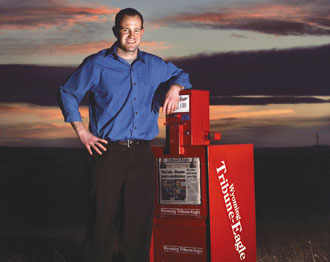 Only Game in Town
Only Game in Town
Writing for a small paper can be rewarding, except when you have to switch supermarket aisles to avoid an angry school board member
It's no surprise that Cary Snyder '02 grew up thinking journalism would be his life. After all, his father is a television news broadcaster. In four years as a journalist, Snyder has written for two small Pennsylvania papers and now is a business reporter at the Wyoming Tribune-Eagle in Cheyenne. He has discovered that small papers offer advantages as well as limitations. As for making it to a big-city paper, the state of the business has him rethinking his vision of a lifetime in journalism.
In an era where most newspapers are owned by large national chains, what is it like to work at a family-owned newspaper like the Tribune-Eagle? Working at a locally owned paper was one of the attractions to me. You can tell the difference. They are willing to spend money on training staff, like sending us to conferences. They are not afraid to spend that money because they are not answering to stockholders for profit margins. The people making the decisions that affect the quality of the product are just down the hallway from the newsroom; they are not in Alabama or on the other side of the state. In fact, the owners here just spent $12 million on a new printing press. We're not in a situation like at a lot of newspapers where the appearance of the newspaper is poor. We still put out a visually sharp product.
Do smaller newspapers like yours still have to compete with Internet news sources? Yes, but only to an extent. We have been slower to feel the competition compared to bigger-city newspapers. By and large, at the places where I worked, we still only used the Internet as a way to put that day's newspaper online. In Cheyenne, updating the Web site is almost nonexistent during the day. You can get away with that out here, because we are the only game in town.
How does your paper cover national and international issues? We try to localize national issues when appropriate. [During the Iowa caucuses], we interviewed local people to gauge their interest in the presidential elections. We will give front-page, above-the-fold treatment to national and international stories, when appropriate. Even though we are a small newspaper, we operate under the assumption that we are the only newspaper most people here are going to read, at least in hard copy. We feel a responsibility to cover the big stories from around the world.
As a reporter in a small town, are you a local celebrity of sorts? I haven't reached that point yet in Cheyenne. But when I was at the Herald (in Sharon, Pennsylvania) for three years, I would often run into people I had interviewed for a story when I was out shopping or pumping gas. Usually, it makes your job a lot easier, because you learn more about what's going on. But sometimes you don't want the interaction. The school board did something fairly controversial at one point, and after my story ran, I saw one of the board members at the supermarket. I was pretty sure I would not get a warm reception, so when he would turn down one aisle, I would just decide to go down that aisle later.
Are you optimistic about the future? What about your own future in journalism? Interestingly enough, I am actually in the process of getting out of the business. I have pending applications at several law schools and hope to start this coming fall. It is hard to say, but I may not have been making that move if I grew up twenty years ago. I went into journalism expecting to be in it for the long haul, and that hasn't panned out. I'll be honest: the job prospects at larger publications are really not that good. As layoffs and staff reductions are made, there are fewer jobs available at larger places. And the job can be a grind. The hours can be crazy, it is a lot of work, and at some point being an attorney might be a step down as far as pace goes, even if you are working fifty or sixty hours a week at a firm.
Do you have feedback on this page?
